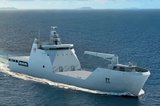Are hypersonics the answer to the Royal Navy's lethality debate?
Future Cruise/Anti Ship Weapon concept graphic. (Image: MBDA)
Speaking at the IISS-hosted First Sea Lord's Sea Power Conference on 5 May, MoD Deputy Chief of the Defence Staff (Financial and Military Capability) Air Mshl Richard Knighton questioned whether hypersonic weapons were the 'optimal solution' for future RN lethality.
The RN has come under criticism for the lack of perceived lethality in the surface fleet, highlighted by the future retirement of the Harpoon Block 1C missiles in 2023 with no immediate replacement.
British politicians on the UK Parliament's Defence Committee have branded RN ships 'porcupines' – well defended but lacking the ability to strike.
Knighton said during a
Already have an account? Log in
Want to keep reading this article?
More from Naval Warfare
-
![Ireland releases maritime strategy as it looks to new naval bases and stronger partnerships]()
Ireland releases maritime strategy as it looks to new naval bases and stronger partnerships
Ireland has a maritime area ten times the size of its land mass but has a limited naval capacity and faces an ongoing threat to critical underwater infrastructure. A new strategy is looking to address the challenge.
-
![What capabilities are being tested under AUKUS Pillar II?]()
What capabilities are being tested under AUKUS Pillar II?
Collaboration on AUKUS Pillar II extends beyond the core trilateral agreement, presenting global opportunities for companies with advanced technologies.
-
![Australia signs US$2.8 billion ship deal with Austal but puts pressure on company to deliver]()
Australia signs US$2.8 billion ship deal with Austal but puts pressure on company to deliver
The A$4 billion Landing Craft Heavy contract for Austal follows on from a A$1 billion deal in December for Landing Craft Medium ships, but the Australian government has made it clear that a contract for Mogami frigates is reliant on the success of these two contracts.





















